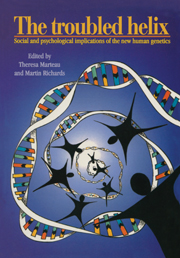Book contents
- Frontmatter
- Contents
- List of contributors
- Preface
- Preface to the paperback edition
- Acknowledgements
- Part I Personal stories
- Part II Clinical context
- Part III Social context
- 9 The troubled helix: legal aspects of the new genetics
- 10 Human pedigree and the ‘best stock’: from eugenics to genetics?
- 11 Public understanding of the new genetics
- 12 Families, kinship and genetics
- 13 Ethics of human genome analysis: some virtues and vices
- 14 Genetics and racism
- 15 Predictive genetics: the cultural implications of supplying probable futures
- 16 The new genetics: a feminist view
- 17 Afterword
- Index
13 - Ethics of human genome analysis: some virtues and vices
from Part III - Social context
Published online by Cambridge University Press: 01 June 2011
- Frontmatter
- Contents
- List of contributors
- Preface
- Preface to the paperback edition
- Acknowledgements
- Part I Personal stories
- Part II Clinical context
- Part III Social context
- 9 The troubled helix: legal aspects of the new genetics
- 10 Human pedigree and the ‘best stock’: from eugenics to genetics?
- 11 Public understanding of the new genetics
- 12 Families, kinship and genetics
- 13 Ethics of human genome analysis: some virtues and vices
- 14 Genetics and racism
- 15 Predictive genetics: the cultural implications of supplying probable futures
- 16 The new genetics: a feminist view
- 17 Afterword
- Index
Summary
Introduction
The applications of human genome analysis (HGA) are numerous and diverse and are being implemented with increasing rapidity as progress in genetic technology and knowledge escalates. A predominant question, frequently being expressed in both Europe and the USA, is one that addresses the problem of whether advances stemming from HGA will be used with due regard to upholding established moral principles and human rights or whether, with insufficient awareness of the ethical issues involved and inadequate regulation, there is a real danger that these might be violated. There are undoubtedly important potential benefits to be gained by both individuals and society but, at the same time, there is some anxiety that serious, adverse social and psychological consequences might arise unless the new knowledge is used ethically.
This chapter will identify a wide range of issues that have already arisen or might feasibly be encountered in the future as the result of HGA. These will be discussed from the standpoint of ethical principles with the intention of illustrating that, overall, society has much to gain and that many of the possible hazards may be overcome provided that professional and public awareness of ethical implications is promoted and safeguards are instigated to ensure the amelioration of harm.
What is human genome analysis?
Human genome analysis is the resolution of genetic information that is encoded within the entire complement of human hereditary material.
- Type
- Chapter
- Information
- The Troubled HelixSocial and Psychological Implications of the New Human Genetics, pp. 274 - 294Publisher: Cambridge University PressPrint publication year: 1996
- 9
- Cited by

